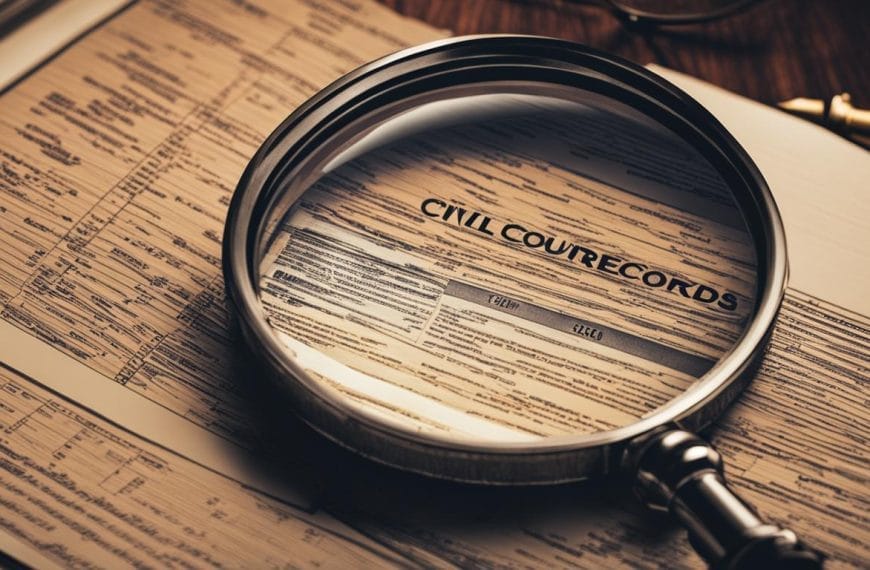Are you looking to access civil court records in Pennsylvania? Whether you’re a legal professional, researcher, or just curious, finding civil case information in Pennsylvania is easier than ever. With the help of online resources, you can look up civil cases without the need to visit a physical courthouse. Pennsylvania civil court records contain valuable information about the complaint, evidence, trial transcript, and final verdict, providing a comprehensive view of the case.
By utilizing online tools like the Unified Judicial System web portal, you can conveniently search for civil cases in Pennsylvania from the comfort of your own home. The Unified Judicial System provides a Judiciary Case Search feature, allowing you to access the records of civil suits and court proceedings across the state. Simply enter the relevant keywords, such as “how to look up civil cases in Pennsylvania” or “civil case search Pennsylvania,” to narrow down your search and find the information you need.
Types of Civil Cases Heard in Pennsylvania
Civil cases heard in Pennsylvania cover a wide range of legal disputes. The state’s civil courts oversee various types of cases, including:
Negligence Cases
Negligence cases involve situations where someone’s actions or failure to act have caused harm or injury to another person. These types of cases often include personal injury claims resulting from accidents, medical malpractice, or instances of assault or battery.
Contract Disputes
Contract disputes arise when there is a disagreement or breach of contract between two parties. These cases can involve issues such as non-payment, failure to deliver goods or services, or disputes over the terms and conditions outlined in a contract.
Family-Related Cases
Family-related cases heard in Pennsylvania’s civil courts involve matters such as divorce, child custody, child support, and spousal support. These cases can be emotionally charged and require careful consideration of the best interests of the individuals involved, particularly children.
Consumer Complaints
Civil courts in Pennsylvania also handle consumer complaints, especially those involving major financial settlements. These cases typically relate to disputes between consumers and businesses, such as claims of fraud, deceptive practices, or breach of warranty.
| Type of Civil Case | Description |
|---|---|
| Negligence Cases | Cases involving personal injury, medical malpractice, assault, or battery. |
| Contract Disputes | Disputes arising from the breach of contract or disagreements over terms and conditions. |
| Family-Related Cases | Matters such as divorce, child custody, child support, and spousal support. |
| Consumer Complaints | Disputes between consumers and businesses regarding fraud, deceptive practices, or breach of warranty. |
These are just a few examples of the types of civil cases heard in Pennsylvania. The state’s civil court system plays a crucial role in resolving legal disputes and ensuring justice is served for all parties involved.
Pennsylvania’s Civil Court System
The Pennsylvania judicial system is composed of six courts with different authorities and jurisdictions. These include:
- State Supreme Court
- Superior Court
- Commonwealth Court
- Courts of Common Pleas
- Magisterial District Courts
- Various Municipal Courts
The civil court system in Pennsylvania follows a three-level tribunal process. It starts with the magisterial district court, followed by the courts of common pleas. In the pre-trial stage, judges and attorneys hold conferences to discuss the case before proceeding to trial. After the trial, a judgment is rendered. Parties dissatisfied with the verdict have the option to appeal to one of Pennsylvania’s appellate courts.
Please refer to the table below for a comprehensive overview of Pennsylvania’s civil court system:
| Court | Description |
|---|---|
| State Supreme Court | Highest court in the state, primarily focused on constitutional law. |
| Superior Court | Intermediate appellate court that reviews appeals from the Courts of Common Pleas. |
| Commonwealth Court | Handles cases involving state and local government agencies, land use, and administrative law. |
| Courts of Common Pleas | Trial courts that hear a wide range of civil cases, including personal injury, contract disputes, and family matters. |
| Magisterial District Courts | Handles minor civil cases, landlord-tenant disputes, and traffic offenses. |
| Various Municipal Courts | Handles ordinance violations and minor offenses within municipal jurisdictions. |
Contents of Pennsylvania Civil Court Records
Pennsylvania civil court records contain a wealth of information related to civil cases within the state. These records provide detailed insights into the proceedings, from the initial complaint to the final verdict. Let’s take a closer look at the key components found in Pennsylvania civil court records:
1. Complaint Details
The complaint serves as the starting point of a civil case. It outlines the allegations made by the plaintiff against the defendant and provides essential background information about the dispute.
2. Date and Place of Filing
Pennsylvania civil court records include the date and place where the case was officially filed. This information helps establish the timeline and jurisdiction of the case.
3. Personal Information of Plaintiff and Defendant
These records contain the names, addresses, and other personal details of both the plaintiff (the individual or entity bringing the case) and the defendant (the party being sued). This information helps identify the parties involved in the litigation.
4. Evidence
Evidence is a crucial element in any civil case. Pennsylvania civil court records may include details of the evidence presented by both parties, such as documents, photographs, witness testimonies, and expert reports.
5. Trial Transcript
The trial transcript is a verbatim record of everything that was said during the court proceedings. It includes the statements made by the parties, arguments presented by their attorneys, and questions asked by the judge. The transcript provides an accurate account of the trial for future reference.
6. Financial Settlements
In some cases, parties may agree to a financial settlement to resolve the dispute before going to trial. Pennsylvania civil court records may document the details of such agreements, including the amount of the settlement and any stipulations or conditions associated with it.
7. Final Verdict
The final verdict is the outcome of the trial. It represents the judge or jury’s decision on the case, determining whether the plaintiff’s claims were proven and, if so, the appropriate legal remedies or damages awarded.
In addition to these key components, Pennsylvania civil court records also include other relevant information, such as case schedules, summarized conclusions, and any further appeals or post-trial motions. To access these records, individuals can refer to the docket sheets of Pennsylvania’s Appellate Courts, Courts of Common Pleas, and Magisterial District Courts, as well as the court postings/opinions and calendars maintained by the Unified Judicial System of Pennsylvania.
Understanding the contents of Pennsylvania civil court records is essential for anyone seeking details on civil cases within the state. These records provide valuable insights into the litigation process, allowing individuals to access and analyze the information they need.
Sources:
- Unified Judicial System of Pennsylvania
- Appellate Courts of Pennsylvania
- Common Pleas Courts of Pennsylvania
Accessing Pennsylvania Civil Court Records In-person
While Pennsylvania offers remote options for accessing civil court records, in-person requests provide the best method for accessing full court records. When requesting a record remotely, it is essential to first identify the court where the record was filed or the case was heard. Once identified, requestors can then contact the appropriate court office, such as the magisterial district court or the clerk of the court of common pleas.
To access full court records in person, requestors must provide sufficient case information to track the record of interest. This information may include the names of the parties involved, the case number, the date of filing, or any other relevant details. It is advisable to contact the court office in advance to inquire about specific requirements for accessing records and to ensure the availability of the desired information.
Upon visiting the court office in person, requestors may be required to complete and submit a request form. This form typically collects essential information about the requester, the case, and the specific documents or information being sought. Additionally, requestors may need to pay search and copy fees as determined by the court’s fee schedule.
Accessing Pennsylvania civil court records in-person allows requestors to directly interact with court officials and staff who can provide guidance and assistance throughout the process. It also ensures the opportunity to thoroughly examine and review the records of interest, making it the preferred method for those seeking comprehensive access to civil court records in Pennsylvania.
| Advantages of Accessing Civil Court Records In-person | Disadvantages of Accessing Civil Court Records In-person |
|---|---|
|
|
Accessing Pennsylvania Civil Court Records Online
The Unified Judicial System of Pennsylvania operates an online web portal that provides convenient access to Pennsylvania civil court records. Through the UJS web portal, individuals can easily search for and retrieve relevant information from various courts in the state.
Most civil court records in Pennsylvania can be found on the individual web docket tools available on the UJS web portal. These include the Courts of Common Pleas Docket Tool and the Magisterial District Courts Docket Tool. The docket tools allow users to conduct searches using specific criteria, such as the parties involved, the OTN (Office of Traffic Safety Number), or the police incident/complaint number. This helps narrow down the search and retrieve the desired case information efficiently.
In addition to the docket tools, the UJS web portal also provides access to appellate court records. Users can utilize the Appellate Court Docket tool to search for records specific to the appellate courts. This comprehensive online platform ensures that individuals have access to a wide range of civil court records across Pennsylvania.
The UJS web portal goes beyond just case records. It also offers electronically filed documents, opinions, postings, and forms related to civil court cases. This allows individuals to obtain all the necessary information and materials pertaining to a particular case from a single reliable source.
Accessing Pennsylvania civil court records online through the UJS web portal offers a convenient and efficient way to gather the information needed for legal research, background checks, and other purposes. Users can easily navigate the portal’s user-friendly interface to retrieve the desired civil court records anytime, anywhere.
Accessing Civil Court Records via PACER
To access civil and criminal court records of the United States District Court for the Eastern District of Pennsylvania, you can rely on the PACER system. PACER stands for Public Access to Court Electronic Records and provides a convenient way to search for case information and obtain docket reports. With PACER, you can access a wealth of information related to civil court cases, including recent activity, parties and participants, case events, claims registry, new cases, appellate court opinions, judgments or case status, and types of documents filed.
The PACER system is available 24/7, offering a fast and inexpensive service to retrieve comprehensive case information. You can search for case details by name or number and easily print docket reports for your records. Whether you’re an attorney, researcher, or simply interested in accessing court records, PACER provides a user-friendly platform to retrieve the information you need.
To start using PACER, you’ll need to register online to obtain a login and password. Once registered, you’ll have access to the extensive database of civil and criminal court records for the United States District Court for the Eastern District of Pennsylvania.
| Benefits of Using PACER | Drawbacks of Using PACER |
|---|---|
|
|
Conclusion
Accessing civil case information in Pennsylvania is a straightforward process with multiple options available. Whether you prefer in-person visits, online resources, or federal court records, there are various methods to access court records in the state. In-person requests are often recommended for obtaining full court records, providing direct access to the valuable details of a civil case. Additionally, the Unified Judicial System web portal offers a convenient online platform to search and retrieve Pennsylvania civil case information from the comfort of your own home. For federal court records, the PACER system provides a comprehensive and user-friendly interface, allowing you to access civil case details from the United States District Court for the Eastern District of Pennsylvania.
Whether you are a legal professional, researcher, or simply curious, Pennsylvania’s civil court records are valuable resources. These records contain crucial information such as the complaint filed, evidence presented, trial transcripts, and final verdicts. As you navigate through the intricacies of Pennsylvania’s judicial system, remember to explore the vast resources available to find the civil case information you seek.
By understanding how to access court records and conduct a Pennsylvania civil case search, you can gain valuable insights into past proceedings, legal precedents, and important details that may be crucial to your own case or research. Accessing civil court records empowers individuals with knowledge and reinforces the principles of transparency within our legal system. So whether you’re a legal professional or a curious individual, take advantage of the available resources to uncover the wealth of information contained within Pennsylvania’s civil court records.













